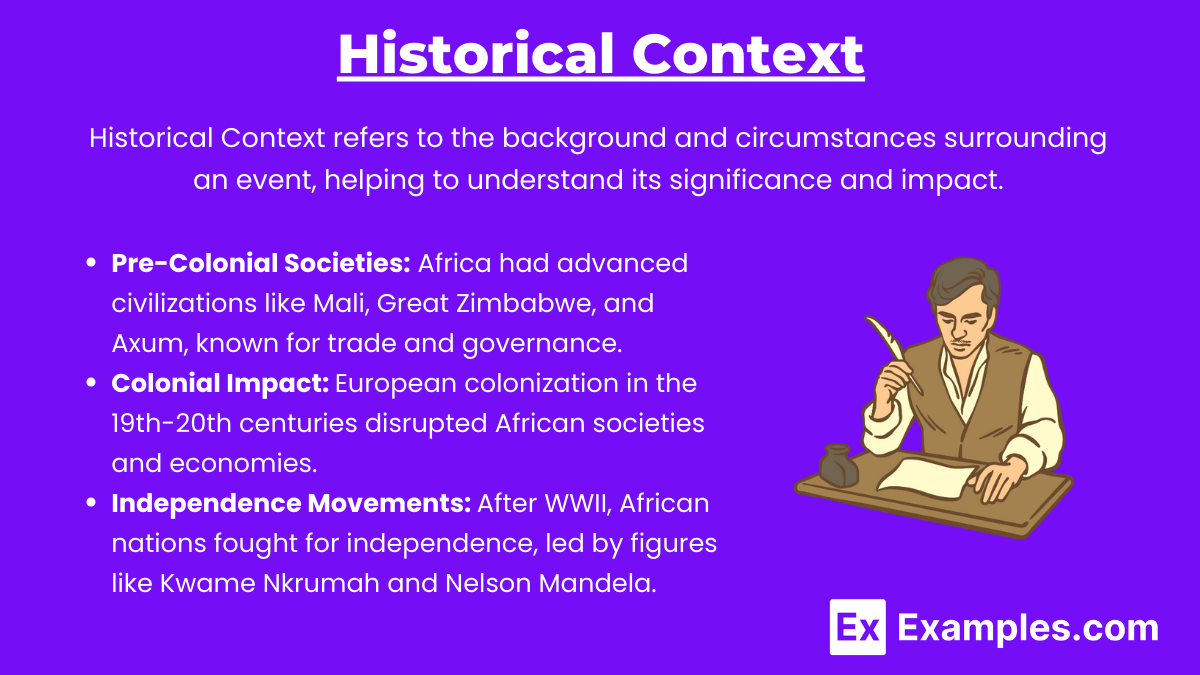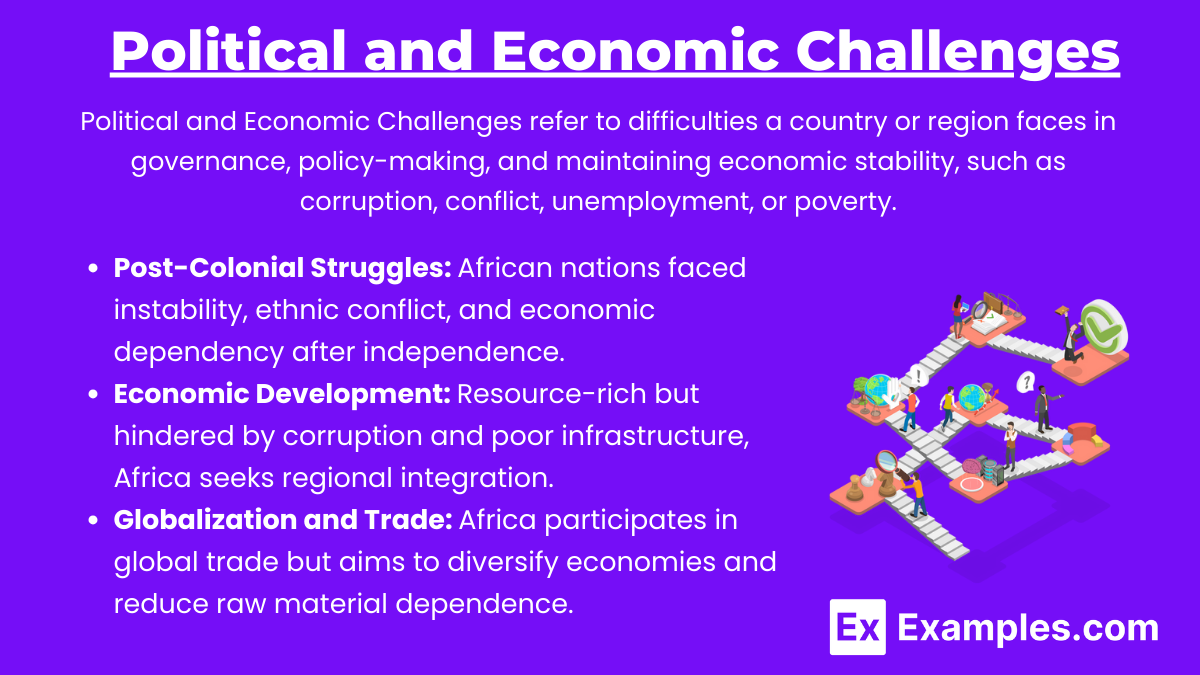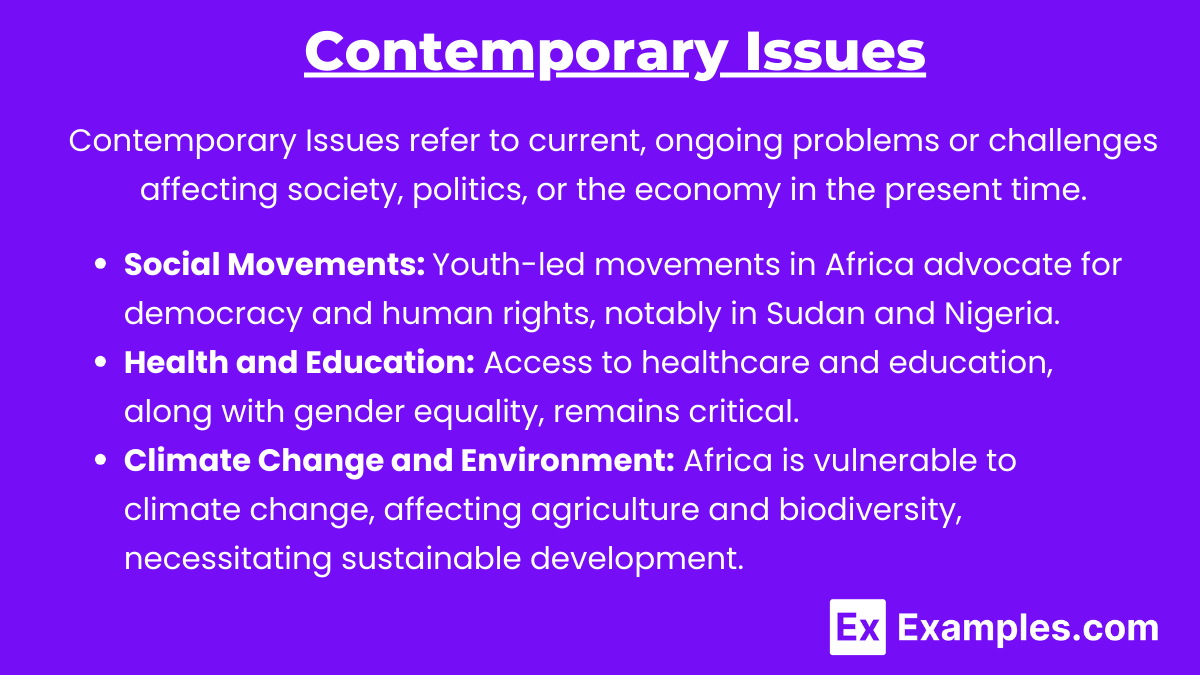Africa, the second-largest continent, is a treasure trove of historical significance and cultural richness that has profoundly influenced global civilization. Known for its remarkable ancient empires, such as Egypt and Mali, Africa has been a center for trade, artistic expression, and intellectual achievements. The legacy of colonization has left lasting impacts on its political and economic frameworks. In the present day, Africa is characterized by its diverse cultures, resilient societies, and persistent challenges in development and governance.
Learning Objectives
In studying “Africa” for AP World History: Modern, focus on key civilizations like Ancient Egypt and the Mali Empire, along with their cultural contributions. Understand the impact of European colonization and the independence movements of the mid-20th century. Evaluate post-colonial challenges, explore Africa’s cultural diversity, and analyze its role in the modern global economy and political landscape, particularly regarding globalization and trade.
Africa is the second-largest continent, rich in diversity with over 1,500 languages spoken and a variety of ethnic groups. Major cultural regions include North Africa, Sub-Saharan Africa, West Africa, East Africa, Central Africa, and Southern Africa. Each region has distinct traditions, social structures, and histories influenced by geography, climate, and colonial pasts.
1. Historical Context

Historical Context refers to the background information surrounding a particular event, period, or development, helping to understand its causes, significance, and impact based on the social, political, and cultural circumstances of the time.
- Pre-Colonial Societies: Before European colonization, Africa had thriving civilizations like the Mali Empire, Great Zimbabwe, and the Kingdom of Axum. These societies engaged in trade, established complex political structures, and contributed significantly to global culture and knowledge.
- Colonial Impact: The late 19th and early 20th centuries saw the “Scramble for Africa,” where European powers divided the continent among themselves. Colonization disrupted traditional societies, economies, and governance, leading to significant cultural and social changes.
- Independence Movements: After World War II, many African nations gained independence through various movements. Leaders like Kwame Nkrumah (Ghana) and Nelson Mandela (South Africa) played crucial roles in advocating for freedom and human rights.
2. Political and Economic Challenges

Political and Economic Challenges refer to difficulties a country or region faces in governance, policy-making, and maintaining economic stability, such as corruption, conflict, unemployment, or poverty.
- Post-Colonial Struggles: Many newly independent states faced challenges such as political instability, ethnic conflict, and economic dependency on former colonizers. The legacy of colonialism often resulted in artificial borders that grouped diverse ethnic groups together, leading to tensions.
- Economic Development: Africa is rich in resources, but many countries struggle with economic development due to factors like corruption, lack of infrastructure, and reliance on agriculture. Efforts toward regional integration (e.g., African Union) aim to address these issues.
- Globalization and Trade: African countries are increasingly involved in global trade, but the benefits are often uneven. The continent seeks to diversify its economies and reduce dependence on raw material exports.
3. Contemporary Issues

Contemporary Issues are current challenges affecting societies today, such as political instability, climate change, or economic inequality. These issues impact global and local communities. They require immediate attention and action to address their effects.
- Social Movements: Today, African nations are witnessing the rise of social movements advocating for democracy, human rights, and environmental sustainability. Youth-led protests are common in countries like Sudan and Nigeria.
- Health and Education: Issues like access to healthcare, education, and gender equality remain critical. Efforts to improve health systems, combat diseases (e.g., HIV/AIDS, malaria), and enhance educational opportunities are ongoing.
- Climate Change and Environment: Africa is particularly vulnerable to climate change impacts, affecting agriculture, water resources, and biodiversity. Strategies for sustainable development and environmental conservation are crucial for the continent’s future.
Examples
Example 1 : Ancient Civilizations
Africa is home to some of the world’s earliest civilizations, including Ancient Egypt, known for its monumental architecture like the pyramids and the Sphinx. The Kingdom of Kush, located to the south of Egypt, also thrived, contributing to the region’s rich cultural heritage through trade, art, and advances in writing.
Example 2 : The Kingdom of Mali
The Mali Empire, flourishing in the 13th to 16th centuries, was a major center for trade, education, and culture in West Africa. Under the reign of Mansa Musa, it became famous for its wealth and the legendary city of Timbuktu, which housed one of the first universities and attracted scholars from across the Islamic world.
Example 3 : Apartheid in South Africa
Apartheid was a system of institutionalized racial segregation and discrimination in South Africa from 1948 until the early 1990s. This era saw widespread resistance, led by figures such as Nelson Mandela, culminating in the end of apartheid and the establishment of a multiracial democracy in 1994.
Example 4 : The Rwandan Genocide
The Rwandan Genocide of 1994 was a catastrophic event where an estimated 800,000 Tutsi and moderate Hutu were killed over a span of just 100 days. This tragedy highlighted the dangers of ethnic division and the international community’s failure to intervene effectively.
Example 5 : African Union (AU)
Established in 2001, the African Union is a continental organization aimed at promoting unity and cooperation among African nations. The AU works on various issues, including political stability, economic development, and peacekeeping efforts, playing a crucial role in addressing the continent’s challenges.
Multiple Choice Questions
Question 1
What ancient civilization is known for its monumental architecture, including the pyramids and the Sphinx?
A) Mali Empire
B) Kingdom of Kush
C) Ancient Egypt
D) Carthage
Answer: C) Ancient Egypt
Explanation: Ancient Egypt is renowned for its impressive architectural achievements, particularly the pyramids built as tombs for pharaohs and the Sphinx, a symbol of strength and wisdom. It was one of the earliest and most influential civilizations in human history.
Question 2
What was the primary focus of the African Union (AU) since its establishment?
A) Promote economic competition among African nations
B) Ensure the military dominance of member states
C) Foster unity and cooperation among African nations
D) Develop a single currency for the continent
Answer: C) Foster unity and cooperation among African nations
Explanation: The African Union aims to enhance solidarity and cooperation among African countries to address various issues such as political stability, economic development, and social challenges. It focuses on collective action to promote peace and security across the continent.
Question 3
Which event in 1994 highlighted the severe consequences of ethnic division in Rwanda?
A) The establishment of the African Union
B) The Rwandan Genocide
C) The signing of the Treaty of Versailles
D) The end of apartheid in South Africa
Answer: B) The Rwandan Genocide
Explanation: The Rwandan Genocide was a horrific event where approximately 800,000 people, primarily Tutsi and moderate Hutu, were killed in a span of 100 days. It underscored the dangers of ethnic tensions and the international community’s failure to prevent mass violence.


